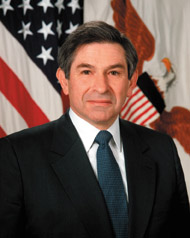 |
|
|||||||||
|
In the May 4 New York Times writer James Atlas traced an intellectual genealogy much in the news this spring: the connections between “the cohort of journalists, political philosophers, and policy wonks known as Straussians.” Classicist and political philosopher Leo Strauss, who taught at Chicago from 1949 until 1967, was known for his critiques of value-free social science. How influential are Straussians? Here are some with U of C degrees.
72 Deputy Secretary of Defense Paul D. Wolfowitz, PhD’72, is close to the roots of the Strauss family tree. Earning a doctorate in political science, he studied at Chicago with the late mathematician and nuclear strategist Albert Wohlstetter, who, according to Atlas, “put forward the idea of ‘graduated deterrence’—limited, small-scale wars fought with “smart” precision-guided bombs.” Wolfowitz, who wrote his dissertation on nuclear proliferation in the Middle East, has a c. vitae that includes seven years as dean of Johns Hopkins University’s Paul H. Nitze School of Advanced International Studies (SAIS). He served as U.S. ambassador to Indonesia for three years during the Reagan presidency and as undersecretary of defense for policy (1989–1993) helped shape both post–Cold War and Gulf War strategy. “Recruited by Secretary of Defense Donald H. Rumsfeld,” Atlas writes, “Mr. Wolfowitz is widely regarded as a chief architect of foreign policy.” 69 Wohlstetter also taught Ahmad Chalabi, PhD’69, a founder and leader of the Iraqi National Congress who is a contender for a leading role in the post-Hussein government. Chalabi, who did his mathematics thesis at Chicago on ring theory, is a controversial figure within Iraq and the Bush administration, in part because of his 1992 conviction in Jordan for bank fraud (a conviction he charges was politically motivated). This item was corrected on 11.28.05. 72 Another Straussian Atlas doesn’t mention is Abram Shulsky, AM’68, PhD’72, director of the Pentagon’s Office of Special Plans. Convened by Wolfowitz in the aftermath of September 11, 2001, these policy analysts and advisers, writes Seymour Hersh, AB’58, in the May 12 New Yorker, “have produced a skein of intelligence reviews that have helped to shape public opinion and American policy toward Iraq.” With Gary Schmitt, AM’76, PhD’80 (mentioned by Atlas), executive director of the conservative foreign-policy group Project for the New American Century, Shulsky cowrote a 1999 essay, “Leo Strauss and the World of Intelligence (By Which We Do Not Mean Nous).” 79 Earning a spot on Atlas’s family tree is Zalmay Khalilzad, PhD’79, a member of the National Security Council who is also President Bush’s special envoy to the Iraqi opposition. A native of Afghanistan, he had a similar role in setting up the post-Taliban administration in that country. Khalilzad also studied under Wohlstetter, and he sees the postwar challenge of creating a democratic government in Iraq in Straussian terms, telling the March 31 New York Times that “the transformation of the Middle East and the Islamic world at large” is “the historic challenge of our times.” 39 Novelist and former Chicago professor Saul Bellow, X’39, gets mentioned in Atlas’s Leo-con genealogy as a quasi-biographer of the Allan Bloom, AB’49, AM’53, PhD’55, whose Closing of the American Mind (1987) helped popularize Straussian ideals of democracy. In Ravelstein (2000), Altlas writes, Bellow “depicts the information-avid professor Abe Ravelstein fielding calls on his cell phone from former students who have made their way to high places in government.” But Bellow also garnered ink for another reason this spring; the May Chicago magazine celebrated the upcoming 50th anniversary of the publication of The Adventures of Augie March. Some critics consider it the great American novel—which may have to do with its often-quoted first sentence: “I am an American, Chicago born—Chicago, that somber city—and go at things as I have taught myself, free-style, and will make the record in my own way....” —M.R.Y.
|
|
Contact
|


